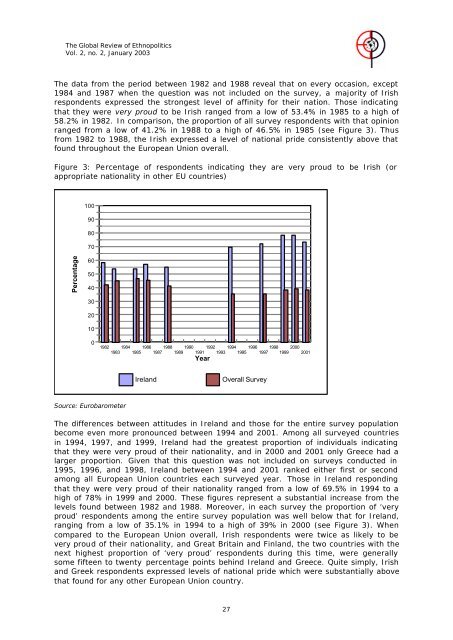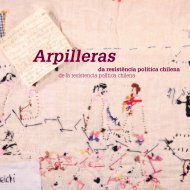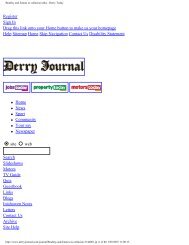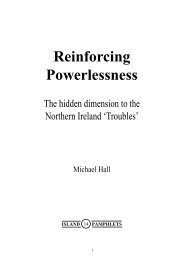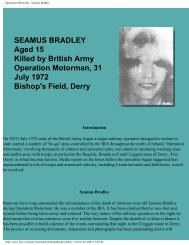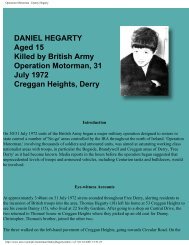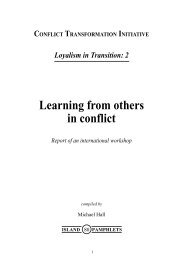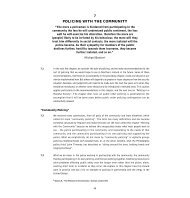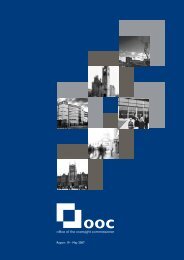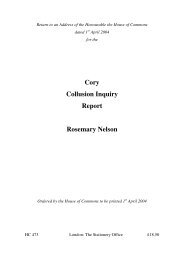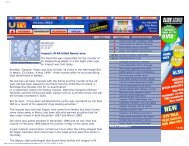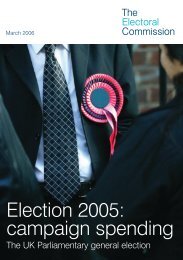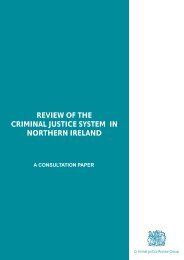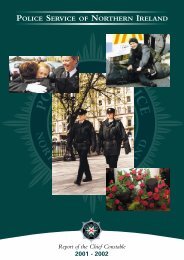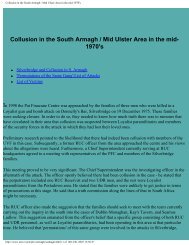Davis, <strong>The</strong> <strong>Irish</strong> <strong>and</strong> <strong>The</strong>ir <strong>Nation</strong><strong>The</strong> other element <strong>of</strong> culture, the arts <strong>and</strong> literature, was addressed with the followingsurvey question:How proud are you <strong>of</strong> Irel<strong>and</strong>’s achievements in the arts <strong>and</strong> literature?Among the <strong>Irish</strong>, 58.9% indicated that they were very proud <strong>of</strong> achievements in thisarea, while only 29.1% <strong>of</strong> the total number <strong>of</strong> respondents held that opinion (see Figure2). As with pride in sports, the proportion <strong>of</strong> <strong>Irish</strong> respondents expressing this strongestlevel <strong>of</strong> pride in arts <strong>and</strong> literature was double the figure for the entire survey population<strong>and</strong> the highest among all countries. Italy (47.4%) <strong>and</strong> Bulgaria (46.7%) ranked justbehind Irel<strong>and</strong>. <strong>The</strong> Netherl<strong>and</strong>s (12.4%), Pol<strong>and</strong> (14.1%), <strong>and</strong> Sweden (15.6%) had thesmallest proportion <strong>of</strong> respondents with that view. Overall, these attitudes toward sports,arts, <strong>and</strong> literature in Irel<strong>and</strong> are compatible with the claim that Gaelic culture is a vitalingredient in the conceptualization <strong>of</strong> the <strong>Irish</strong> nation (Bromage 1968; Archer 1984;Hutchinson 1987; McCaffrey 1989; White 1996; <strong>and</strong> O’Mahony <strong>and</strong> Delanty 1998). <strong>The</strong>seresults also seem to support Smith’s (1991) identification <strong>of</strong> a common mass publicculture as a basic element <strong>of</strong> national identity.<strong>The</strong> ISSP data examined above reveal that strong levels <strong>of</strong> national affiliation, includingfeelings <strong>of</strong> closeness to the nation <strong>and</strong> pride in national history, arts <strong>and</strong> literature, <strong>and</strong>sports, were consistently greater in Irel<strong>and</strong> than for the survey population as a whole.Additionally, certain national characteristics such as birth, residence, <strong>and</strong> religion weredeemed more essential by the <strong>Irish</strong> for <strong>their</strong> conception <strong>of</strong> nationality than was the casefor the overall survey population. Overall, these findings demonstrate that a considerablebond exists in Irel<strong>and</strong> between the individual <strong>and</strong> nation, <strong>and</strong> that most <strong>of</strong> the commonlydescribed national characteristics are indeed part <strong>of</strong> the foundation <strong>of</strong> <strong>Irish</strong> nationalidentity.Eurobarometer AnalysisAdditional insight into <strong>Irish</strong> national identity is also possible through an analysis <strong>of</strong> datafrom a biannual survey, Eurobarometer, administered by the European Union in allmember states. 3 While its primary purpose is to measure attitudes regarding Europeanintegration <strong>and</strong> EU institutions <strong>and</strong> policies, this survey provides a wealth <strong>of</strong> data on awide range <strong>of</strong> political, social, <strong>and</strong> economic issues. Two questions in particular addressnational identity <strong>and</strong> <strong>of</strong>fer an opportunity to evaluate <strong>Irish</strong> attitudes <strong>and</strong> compare themto opinion found in the other member states. Moreover, these questions have beenincluded in most <strong>of</strong> the surveys over the two decades, thereby permitting an examination<strong>of</strong> the evolution <strong>of</strong> national identity in Irel<strong>and</strong> <strong>and</strong> the rest <strong>of</strong> the EU. <strong>The</strong> first <strong>of</strong> thesequestions, appearing for the first time in 1982, probes national pride <strong>and</strong> provides a goodindication <strong>of</strong> the degree to which the <strong>Irish</strong> are attached to <strong>their</strong> nation.Would you say that you are very proud, fairly proud, not very proud, or not at all proudto be <strong>Irish</strong>? 4Consistent with the approach taken in the earlier analysis <strong>of</strong> the ISSP national pridequestions, those who indicated that they were very proud to be <strong>Irish</strong> is <strong>of</strong> most interest.This type <strong>of</strong> sentiment suggests a strong attachment to the nation <strong>and</strong> provides a meansfor underst<strong>and</strong>ing the depth <strong>of</strong> <strong>Irish</strong> identity. <strong>The</strong> question appeared with someconsistency between 1982 <strong>and</strong> 1988 <strong>and</strong> again between 1994 <strong>and</strong> 2001, but was notincluded between 1989 <strong>and</strong> 1993. Consequently, it is perhaps most useful to consider thedata in these two time frames, 1982-1988 <strong>and</strong> 1994-2001.3 <strong>The</strong> regular Eurobarometer survey sample size is approximately 1,000 individuals in each country with theexception <strong>of</strong> Luxembourg (600 respondents), the United Kingdom (1,000 respondents in Great Britain <strong>and</strong> 300respondents in Northern Irel<strong>and</strong>), <strong>and</strong> Germany (1,000 respondents in the former East Germany <strong>and</strong> 1,000respondents in the former West Germany).4 In each European Union country, the appropriate nationality is used in place <strong>of</strong> the word ‘<strong>Irish</strong>’. AllEurobarometer questions examined in this study are similarly treated.26
<strong>The</strong> Global Review <strong>of</strong> EthnopoliticsVol. 2, no. 2, January 2003<strong>The</strong> data from the period between 1982 <strong>and</strong> 1988 reveal that on every occasion, except1984 <strong>and</strong> 1987 when the question was not included on the survey, a majority <strong>of</strong> <strong>Irish</strong>respondents expressed the strongest level <strong>of</strong> affinity for <strong>their</strong> nation. Those indicatingthat they were very proud to be <strong>Irish</strong> ranged from a low <strong>of</strong> 53.4% in 1985 to a high <strong>of</strong>58.2% in 1982. In comparison, the proportion <strong>of</strong> all survey respondents with that opinionranged from a low <strong>of</strong> 41.2% in 1988 to a high <strong>of</strong> 46.5% in 1985 (see Figure 3). Thusfrom 1982 to 1988, the <strong>Irish</strong> expressed a level <strong>of</strong> national pride consistently above thatfound throughout the European Union overall.Figure 3: Percentage <strong>of</strong> respondents indicating they are very proud to be <strong>Irish</strong> (orappropriate nationality in other EU countries)100908070Percentage60504030201001982 1984 1986 1988 1990 1992 1994 1996 1998 20001983 1985 1987 1989 1991 1993 1995 1997 1999 2001YearIrel<strong>and</strong>Overall <strong>Survey</strong>Source: Eurobarometer<strong>The</strong> differences between attitudes in Irel<strong>and</strong> <strong>and</strong> those for the entire survey populationbecome even more pronounced between 1994 <strong>and</strong> 2001. Among all surveyed countriesin 1994, 1997, <strong>and</strong> 1999, Irel<strong>and</strong> had the greatest proportion <strong>of</strong> individuals indicatingthat they were very proud <strong>of</strong> <strong>their</strong> nationality, <strong>and</strong> in 2000 <strong>and</strong> 2001 only Greece had alarger proportion. Given that this question was not included on surveys conducted in1995, 1996, <strong>and</strong> 1998, Irel<strong>and</strong> between 1994 <strong>and</strong> 2001 ranked either first or secondamong all European Union countries each surveyed year. Those in Irel<strong>and</strong> respondingthat they were very proud <strong>of</strong> <strong>their</strong> nationality ranged from a low <strong>of</strong> 69.5% in 1994 to ahigh <strong>of</strong> 78% in 1999 <strong>and</strong> 2000. <strong>The</strong>se figures represent a substantial increase from thelevels found between 1982 <strong>and</strong> 1988. Moreover, in each survey the proportion <strong>of</strong> ‘veryproud’ respondents among the entire survey population was well below that for Irel<strong>and</strong>,ranging from a low <strong>of</strong> 35.1% in 1994 to a high <strong>of</strong> 39% in 2000 (see Figure 3). Whencompared to the European Union overall, <strong>Irish</strong> respondents were twice as likely to bevery proud <strong>of</strong> <strong>their</strong> nationality, <strong>and</strong> Great Britain <strong>and</strong> Finl<strong>and</strong>, the two countries with thenext highest proportion <strong>of</strong> ‘very proud’ respondents during this time, were generallysome fifteen to twenty percentage points behind Irel<strong>and</strong> <strong>and</strong> Greece. Quite simply, <strong>Irish</strong><strong>and</strong> Greek respondents expressed levels <strong>of</strong> national pride which were substantially abovethat found for any other European Union country.27


